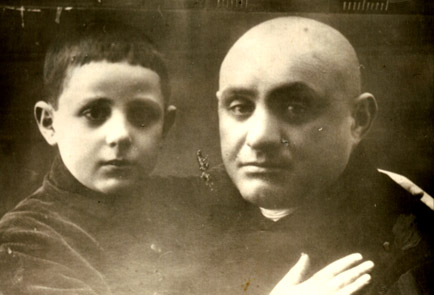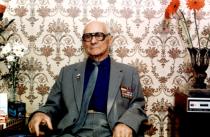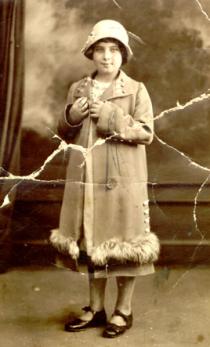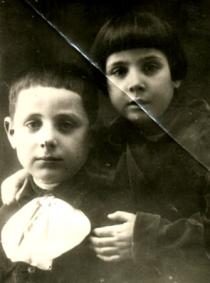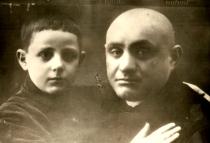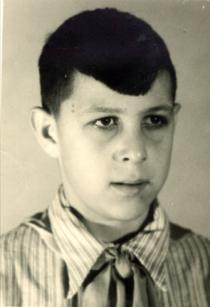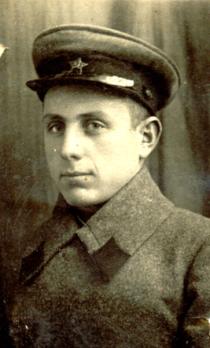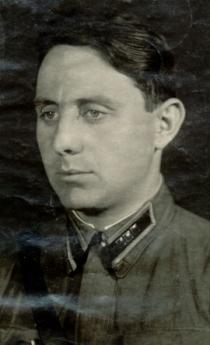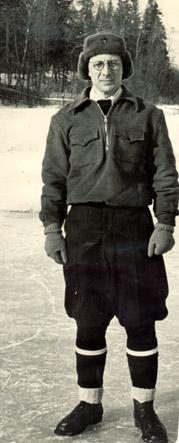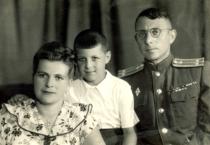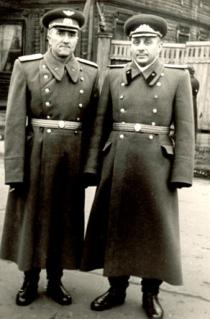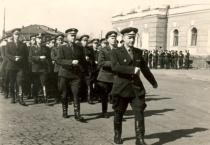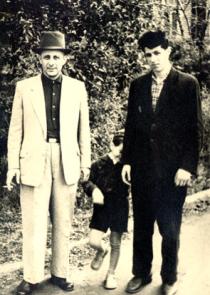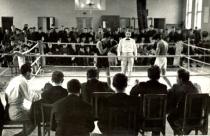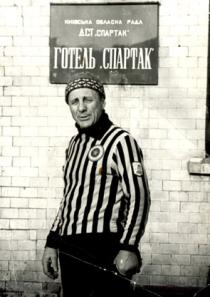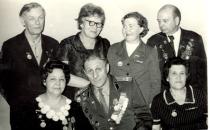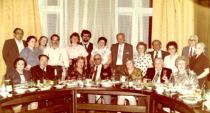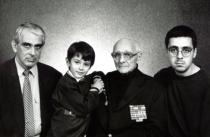This is me with my father Aron Kagan. We had two copies of this photo: one for us and one for my grandmother, my mother's mother. This photo was taken in Kiev in 1926.
My father was born in Kiev, in 1896, he remained an orphan at the age of 7. After my grandfather and grandmother died my father went to live with my uncle Yankl and his wife Perl. When my father grew older, Yankl trained him in his business, and later his brother Iosif trained him his vocation and before getting married my father worked in Iosif's forge. My father's mother tongue was Yiddish. I think the only place my father's brothers studied was cheder. My father studied in the cheder for two years, but he did not finish it. He could write a little and knew only one arithmetic action: addition. My father and his brothers were religious. When they were growing up, the community only acknowledged religious way of life, and different views were not appreciated. In 1918 my father married Doba Braginskaya, a cheerful girl from the nearby Romanovka village.
My father bought horses and a wagon to work on his own before getting married. He also somehow managed to get a 2-bedroom apartment on the 2nd floor of a 2-storied mansion in the center of Kiev. My parents had their bedroom in a smaller room, and the bigger room served as the children's room. There was also a kitchen. I was born in this house in 1920. I was named Grigoriy after my mother's father and my Jewish name is Gersh. My sister Yulia was born in 1922.
I cannot say my parents were strongly religious. My father often worked on Saturday. We did not celebrate Sabbath. My father went to the small one-storied nearby synagogue in Bolshaya Vasilkovskaya Street on the main Jewish holidays. He took me with him after I turned five. My parents spoke Yiddish and Russian at home and I spoke both languages well.
When I turned five, my parents decided it was time for me to start my studies. It was common for Jewish children to go to study at the age of 5. However, I could not go to school before turning 8 years of age, according to Soviet standards, but my parents arranged with the teacher to give me classes at home. Within three years I attained the knowledge corresponding to the syllabus of 3 grades of general education school. I turned 8 in 1928 and my mother and I went to the nearby 7-year Ukrainian school. Its director told mama that there was an order issued by the people's commissar of education for Jewish children to study in Jewish schools, Russian children in Russian schools and Ukrainian children in Ukrainian schools. He refused to admit me to the 1st grade. Mama asked him whether it was possible for me to go to the 2nd grade. Since the order was issued in 1928 it did not refer to pupils of the 2nd grade. I was given an entrance test: the teacher of mathematic wrote a problem on the blackboard during a break at school and I resolved it instantly. I was admitted to the 2nd grade. My classmates were one year older than me. They were born in 1919. However, I was the best pupil in my class. I was one of the first to become a pioneer in my class, though I was the youngest. I was elected chairman of the pioneer unit in my class and then chairman of the pupils' committee at school. There were few other Jewish children in my class. There was no anti-Semitism. There was no national segregation in my school.
